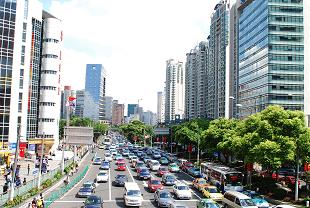The challenge of urbanisation
At current rates of urbanisation it is predicted that more than two-thirds of us will be living in cities in the next forty years while the world’s population continues to grow rapidly. To ignore these trends is to be constantly playing catch up with our city service provision and to miss vital opportunities to create a different vision of our Urban Future.

By now we are all well aware of the negative impacts of rapid urbanisation taking place as more and more of our population lives in cities. Many of us experience them on a daily basis; traffic congestion, services struggling to keep up with demand, pressure on affordable housing. Many cities in the twentieth century grew following a model based on private vehicle ownership and low fuel costs expanding to fit all available space and creating silos of land dedicated to different uses. But the reality is that many countries can no longer afford for people to live in this way and planned, compact urbanisation offers unrivalled development opportunities that can be used to the advantage of the entire country – both urban and rural areas.
Economic historical studies have shown that there is a proven positive relation between urbanization and development. It is also clear that the urban economy is more productive due to the proximity of the factors of production and increased specialization and market sizes. In The State of the World’s Cities Report 2012/13: The Prosperity of Cities, UN-Habitat showed that cities are places of economic growth and where people find satisfaction and the provision of goods and services.
Urban policies
Cities and towns in developing countries are facing serious challenges due to the lack of proper urban policies, which include: unemployment, especially amount the youth; high percentages of people living in slums; dominance of the informal sector; inadequate basic services, especially water, sanitation, drainage and energy; unplanned peri-urban expansion; social and political conflict over land; high levels of vulnerability to natural disasters, partly resulting from climate change; and poor mobility systems, among others.
"A sound National Urban Policy provides a framework for future urban development"
Instead of fearing, denying or even trying to halt urbanisation, countries – especially those in Africa and Asia which are urbanising the fastest – need to embrace it. UN-Habitat and our Habitat Agenda Partners work to highlight these challenges and to propose new ways of thinking about how to meet them. The World Urban Campaign provides a living and growing platform for sharing and learning on initiatives, actions and policies driving positive change in cities. It includes partners from governmental and non-governmental organisations as well as the private sector who promote knowledge sharing and best practice.
For example, a sound National Urban Policy provides a framework for future urban development. It ensures maximization of the national and local benefits of urbanization while at the same time mitigating potential negative impacts and adverse externalities. UN-Habitat has engaged with 20 different countries, ten of them in Africa, in order to cooperate in developing their National Urban Policies. These policies are meant to provide a framework for future urban development in countries, and are designed to coordinate the work of different sectors and ministries in urban development. They also ensure that urban planning occurs in phases and addresses the scale of existing problems appropriately.
Mass population growth

In 2015, UN-Habitat will host the Third United Nations Conference on Housing and Sustainable Urban Development (Habitat III). Here the challenges of the present and future will be outlined and addressed by the world’s leaders in urban issues. The inclusive, strategic and forward-looking format will allow government officials to hear from mayors and on-the-ground practitioners about what it really means to be living the urbanization process. Leaders and citizens alike discuss how to approach the new urban agenda from an integrated perspective covering all three pillars of sustainable development; economic, social and environmental.
Through this publication, Climate Action is addressing a defining topic of our era. The articles contained in Sustainable Cities offer a powerful source of knowledge and expertise on the solutions available to us as we face the challenge of sustainable development.








